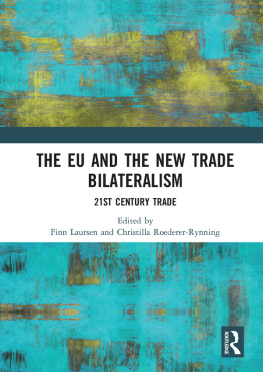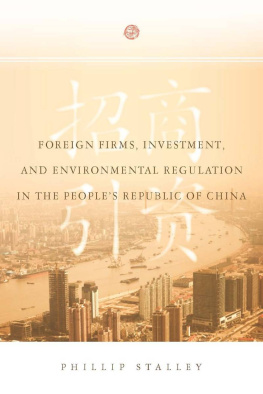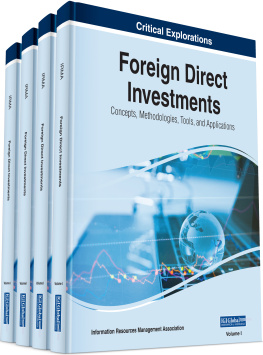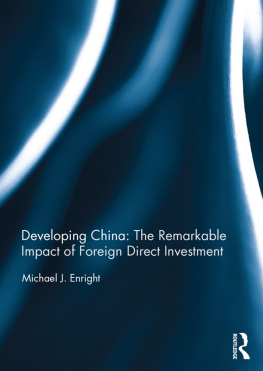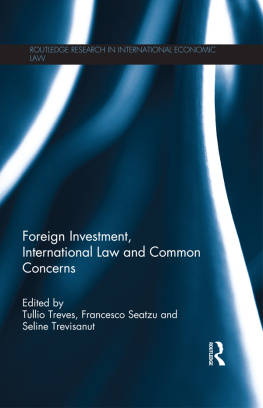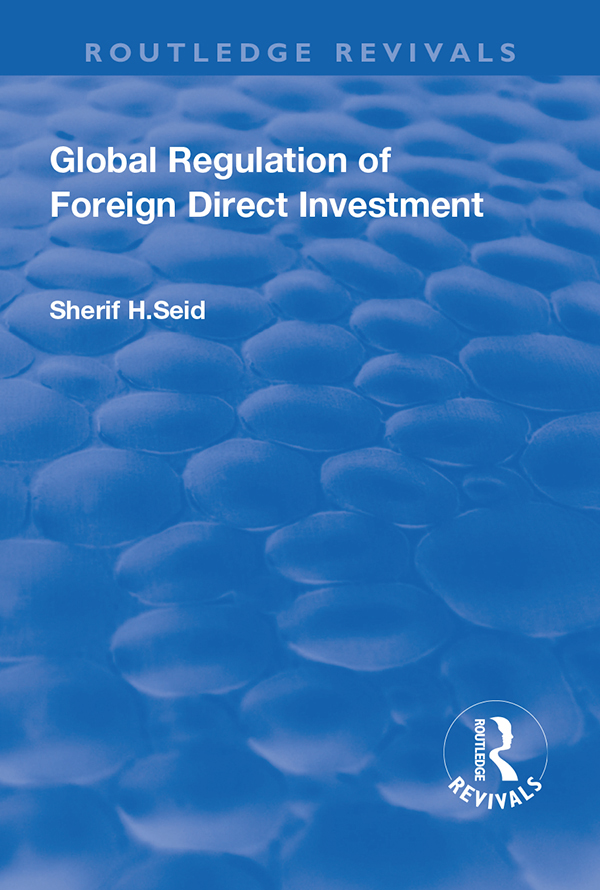
GLOBAL REGULATION OF FOREIGN DIRECT INVESTMENT
First published 2002 by Ashgate Publishing
Reissued 2018 by Routledge
2 Park Square, Milton Park, Abingdon, Oxon OX14 4RN
711 Third Avenue, New York, NY 10017, USA
Routledge is an imprint of the Taylor & Francis Group, an informa business
Copyright Sherif H. Seid 2002
The author has asserted his moral right under the Copyright, Designs and Patents Act, 1988, to be identified as the author of this work.
All rights reserved. No part of this book may be reprinted or reproduced or utilised in any form or by any electronic, mechanical, or other means, now known or hereafter invented, including photocopying and recording, or in any information storage or retrieval system, without permission in writing from the publishers.
Notice:
Product or corporate names may be trademarks or registered trademarks, and are used only for identification and explanation without intent to infringe.
Publishers Note
The publisher has gone to great lengths to ensure the quality of this reprint but points out that some imperfections in the original copies may be apparent.
Disclaimer
The publisher has made every effort to trace copyright holders and welcomes correspondence from those they have been unable to contact.
A Library of Congress record exists under LC control number: 2002100900
ISBN 13: 978-1-138-73867-6 (hbk)
ISBN 13: 978-1-315-18463-0 (ebk)
To Hirut, Hayat and Iman
Foreign direct investment (FDI) can contribute positively to the economic development of the host country. Foreign investors usually bring capital into the host country, thereby influencing the quality and quantity of capital formation in the host country. The inflow of capital and reinvestment of profits increases the total savings of the country and the tax revenue of the Government. FDI can also increase the level of economic activity and social wellbeing in the host country. It can replace inferior production functions in developing countries with superior ones through the transfer of technology, managerial and marketing skills, market information, organisational experience, innovation in products and production techniques, and the training of workers. Moreover, FDI can increase competition in an industry with a likely improvement in productivity. FDI can also widen the market for host country producers by linking the host country industry more closely to world markets, leading to even greater competition and opportunities to technology.
However, if prudent regulatory mechanisms are not in place, FDI may not always be beneficial to the host country. It can, for example, cause considerable environmental damage. In some cases such environmental destruction has led to major social unrest, including calls for secession and civil war (e.g. Bougainville). Some foreign investors may even seek investment in a developing country to escape the burden and costs of stringent environmental regulations in their home countries. Multinational corporations (MNCs) may also involve themselves in transfer pricing, thereby negatively affecting the host governments tax revenue. Moreover, there have been instances where foreign MNCs were involved in internal political affairs of host countries, causing civil unrest and political instability in the host country (e.g. Chile).
After the failure of the Multilateral Agreement on Investment (MAI), the world does not have a global investment agreement that would regulate FDI. A global investment agreement dealing with FDI would clearly fill a large gap in the network of regulatory measures governing the world economy. Other attempts had been made prior to the MAI to address this problem, but all have failed so far. The main reason for such failures has always been the lack of compromise in the positions held by the major stakeholders. This book analyses the pros and cons of these opposing positions and uses them as a basis for forging a hybrid model called Regulated Openness. This hybridity is thus grounded in compromise and pragmatism. But it is a principled pragmatism in two ways. First, the book analyses the weaknesses and strengths of the positions of all the key players in the FDI debate in search of a marriage of these positions where the strengths of one might cover the weaknesses of the other. Second, the book defends a method motivated by the question: What is the best kind of FDI agreement from the starting point of the reality of the key players present positions? This is seen as more productive method than crafting a model from purely analytic foundations that would not apply to any existing world because it would abstract from real positions of real players. In the method applied here, the role of analytic economics, for example, is still important, yet mostly limited to uncovering the weaknesses and strengths of extant economic postures in global politics.
The key players whose positions are described and diagnosed in this book are the OECD and its members, developing countries, public interest groups and representatives of the business community, and international organisations. The method used to collect these data were interviews, cyber observation, attendance of conferences, observation of negotiations and literature review.
Regulated openness is a compromise where the concerns of each major stakeholder would be addressed adequately. It has procedural and substantive dimensions. Procedurally, it is a process where all major stakeholders would have an input and role in the preparation and implementation of FDI laws. A binding international framework agreement on principles is a more pragmatic solution than comprehensive rules. Once the framework agreement of core principles has been formed, each country would have its own detailed rules consistent with the internationally agreed principles and the priorities of individual countries. Substantively, regulated openness means an investment regime where both regulation and openness co-exist in a balanced and pragmatic manner. This balance and co-existence could be achieved within a framework of internationally agreed core principles rather than detailed comprehensive rules. The core principles will be those principles which major stakeholders would regard as paramount, namely sustainable development, enhanced openness of markets, investment security, core labour standards, consumer protection and business ethics, good governance and effective dispute settlement. Moreover, host countries would commit themselves to continuously improve their openness policies as their domestic capability improves and as the guarantees they can secure under the other core principles strengthens.
Regulated openness aims at bringing development with justice. Development with justice requires both procedural justice and credible commitment to continuous improvement of the openness of investment policy, investment security, sustainable development, core labour standards, consumer protection, business ethics and good governance. A commitment to continuously improve these concerns is a path for development with justice. As such, it is a path to politically sustainable liberalisation, as distinct from the politically disastrous trajectory of the MAI. Through seeing why the MAI failed, as an exclusionary agreement that cloaked discrimination against domestic investors as nondiscrimination against FDI, we might grasp how regulated openness could succeed. We also grasp how the seeds of the unsettling of the Millennium Round of the World Trade Organisation (WTO) were sown by the NGO and developing country campaign against the MAI. What they ushered in was perhaps a new era when the powerless have some capacity to scuttle the plans of the powerful for the commanding heights of the world economy.
Next page


